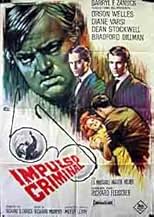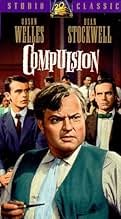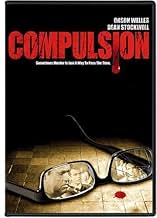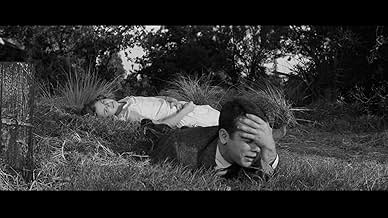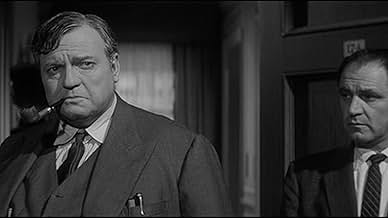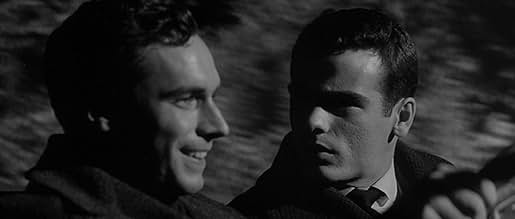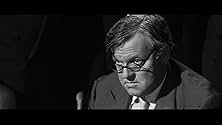IMDb RATING
7.4/10
8.3K
YOUR RATING
Two wealthy law-school students go on trial for murder in this version of the Leopold-Loeb case.Two wealthy law-school students go on trial for murder in this version of the Leopold-Loeb case.Two wealthy law-school students go on trial for murder in this version of the Leopold-Loeb case.
- Nominated for 1 BAFTA Award
- 1 win & 5 nominations total
Robert F. Simon
- Police Lt. Johnson
- (as Robert Simon)
John Alban
- Reporter
- (uncredited)
Don Anderson
- Reporter
- (uncredited)
Brandon Beach
- Courtroom Spectator
- (uncredited)
Terry Becker
- Benson - The Angry Reporter
- (uncredited)
Russ Bender
- Edgar Llewellyn - Attorney
- (uncredited)
- Director
- Writers
- All cast & crew
- Production, box office & more at IMDbPro
Featured reviews
For those who complain about the closing speech being too long.... The closing speech (about 15 minutes?) is excerpts from Clarence Darrow's actual closing remarks at the Leopold & Loeb film. The actual closing statements took 12 hours over two days (so be thankful it wasn't longer!) For that bit of historical inaccuracy I can forgive all the other stuff they weren't allowed to explore indepth in the film. It's also a good anti-capital punishment film. We know the boys are guilty so it's now a question of is it right to kill them as punishment?
If "Compulsion" is still such a powerful film is, totally, Dean Stockwell's merit. What a sensational actor! I'm writing this the day after the announcement of Dennis Hopper's death and while I was looking for a Dennis Hopper movie to watch a came across "Compulsion" Not Hopper but Stockwell and I settled for that anyway. I was riveted by Stockwell's performance because everyone else (with the natural exception of Orson Wells and E G Marshall) seems so dated and acted that Dean's every moment is sheer magic. He doesn't shy away from the awfulness but makes his young monster totally human, provoking in us that element that Orson Welles's closing argument tries to bring to the forefront. If you love great acting, you can't afford to miss Dean Stockwell in "Compulsion"
We can add Welles to Wilde, Monroe and others who we never respected until they were gone. His pleading for the lives of those crazy boys (as Clarence Darrow did) is an eloquent plea for the ending of the death penalty. Funny, how a barometer like the death penalty tells us so much about a society's relative civility. The US had backed away from it, but is now swinging back toward even public executions (which I would much prefer, as they show all of us how barbaric we have become).
Note that the movie dwells on their 'craziness' and 'richness', not the Jewishness or the homosexual relationships that evoked the wrath of the public in the real case. Both Dillman and Dean Stockwell do an excellent job of drawing out your anger until you find yourself one of the mob yelling for blood. To stem the tide, in comes Orson Welles. Welles' phrasing and meaningful looks struck me again with what a magnificent actor he was, as well as director.
Now I have to go read 'Compulsion', the novel around which this movie was made, to determine what was left out and if it would have contributed to some of the obviously omitted details that make this movie a little choppy. This movie performs the task that great art must take on itself: to provide us insights into life and how it should be lived. That can be done either negatively or positively, by point or counter-point.
Of course, unless you had some excellent writers and actors of the stature of Welles, you wouldn't come up to the quality of this movie. Definitely, black and white contributed to the brooding quality of the film. Color would have detracted, and you'll seldom 'hear' me say this.
Note that the movie dwells on their 'craziness' and 'richness', not the Jewishness or the homosexual relationships that evoked the wrath of the public in the real case. Both Dillman and Dean Stockwell do an excellent job of drawing out your anger until you find yourself one of the mob yelling for blood. To stem the tide, in comes Orson Welles. Welles' phrasing and meaningful looks struck me again with what a magnificent actor he was, as well as director.
Now I have to go read 'Compulsion', the novel around which this movie was made, to determine what was left out and if it would have contributed to some of the obviously omitted details that make this movie a little choppy. This movie performs the task that great art must take on itself: to provide us insights into life and how it should be lived. That can be done either negatively or positively, by point or counter-point.
Of course, unless you had some excellent writers and actors of the stature of Welles, you wouldn't come up to the quality of this movie. Definitely, black and white contributed to the brooding quality of the film. Color would have detracted, and you'll seldom 'hear' me say this.
Seeing "Compulsion" again after a very long time, it amazed me how well I remembered it. In fact I remembered every tiny little turn in Dean Stockwell's eyes. He is superb in the part of the young semi genius with a weakness for the shallow Bradford Dillman. The Leopold and Loeb case was the base for this thrilling Richard Fleischer film. It won acting awards for Stockwell, Dillman and Orson Welles at the Cannes Film Festival but with the benefit of hindsight, Dean Stockwell emerges as the winner against the famous test of time. Dillman seems a little bit too everything. Welles is great fun to watch and E G Marshall is terrific as the man determined to unmask the "powder poofs". Stockwell fainting at the trial, something that could have been so over the top, is in fact, shattering. The Leopold and Loeb story was also the base for Hitchcock's "Rope" and the wonderful Tom Kalin's "Swoon" Another version was rumored in 1991, directed by Martin Donovan with River Phoenix in the Stockwell part.
In that actual murder case, two college students who happen to be geniuses decide that the rules don't apply to the superior intellect, and they murder some random child just for the experience, having planned the details out carefully. But since I am writing about this, apparently it was not careful enough.
All of the details of the murder case are pretty accurate, but there are fictional characters installed because this is more of a character study than a historically accurate account. These two fictional characters are Sid (Martin Milner) a college student and newspaper reporter, and his girlfriend Ruth (Diane Varsi).
Judd Steiner (Dean Stockwell) is a rough equivalent to Leopold. Arthur Straus (Bradford Dillman) is a rough equivalent to Loeb. This is still the 1950s, so the production code wouldn't allow you to just come out and say what is going on between the two of them, but the film does as good a job as it can of portraying Steiner as in love with Straus, although the film has Arthur/Artie as being the one who wants to indulge in all of the criminal behavior with Judd mainly going along so he can keep Artie close to him. In fact it was Leopold/Steiner who was the instigator of all of the crimes that led up to murder. Instead, Steiner is portrayed as a timid guy alienated from his family who would have probably just been a self involved loner with weird hobbies if not for the bad influence of Straus. In fact, I think Ruth is in this film just to insinuate that Steiner "liked" girls more than she is there as a girlfriend for the all American student journalist, Sid.
It's actually a pretty good look at what criminal investigators had to work with 100 years ago before there was DNA - identifying a typewriter from a ransom note, and being able to trace one pair of glasses out of thousands like it down to the person who owned them. As for interviews, before "you have the right to remain silent" was part of the police procedural vernacular, the smart investigator wants to keep the suspect talking - if he is guilty eventually he will trip himself up. Bright lights, billy clubs, and brutality are not required.
Although Orson Wells doesn't appear on screen until halfway through the film, he dominates the conclusion. His character, John Wilk, is based on Clarence Darrow who was probably the most famous defense attorney in the country during the early 1900s. He is faced with the difficult task of preventing two rich kids with every advantage who killed a child for the thrill of it all from going to the gallows.
All of the details of the murder case are pretty accurate, but there are fictional characters installed because this is more of a character study than a historically accurate account. These two fictional characters are Sid (Martin Milner) a college student and newspaper reporter, and his girlfriend Ruth (Diane Varsi).
Judd Steiner (Dean Stockwell) is a rough equivalent to Leopold. Arthur Straus (Bradford Dillman) is a rough equivalent to Loeb. This is still the 1950s, so the production code wouldn't allow you to just come out and say what is going on between the two of them, but the film does as good a job as it can of portraying Steiner as in love with Straus, although the film has Arthur/Artie as being the one who wants to indulge in all of the criminal behavior with Judd mainly going along so he can keep Artie close to him. In fact it was Leopold/Steiner who was the instigator of all of the crimes that led up to murder. Instead, Steiner is portrayed as a timid guy alienated from his family who would have probably just been a self involved loner with weird hobbies if not for the bad influence of Straus. In fact, I think Ruth is in this film just to insinuate that Steiner "liked" girls more than she is there as a girlfriend for the all American student journalist, Sid.
It's actually a pretty good look at what criminal investigators had to work with 100 years ago before there was DNA - identifying a typewriter from a ransom note, and being able to trace one pair of glasses out of thousands like it down to the person who owned them. As for interviews, before "you have the right to remain silent" was part of the police procedural vernacular, the smart investigator wants to keep the suspect talking - if he is guilty eventually he will trip himself up. Bright lights, billy clubs, and brutality are not required.
Although Orson Wells doesn't appear on screen until halfway through the film, he dominates the conclusion. His character, John Wilk, is based on Clarence Darrow who was probably the most famous defense attorney in the country during the early 1900s. He is faced with the difficult task of preventing two rich kids with every advantage who killed a child for the thrill of it all from going to the gallows.
Did you know
- TriviaBecause Orson Welles was having tax problems during the production, his entire salary for the movie was garnished several hours after principal photography was completed. This upset Welles so much that during the subsequent looping session to re-record improperly recorded dialogue, Welles suddenly stormed from the studio and left the country. All that was left to fix was twenty seconds of unclear dialogue in Welles' climactic courtroom speech, but editor William Reynolds managed to fix this problem without Welles. He took words and pieces of words that Welles had spoken earlier in the movie, and pieced them one by one into those last twenty seconds.
- GoofsWhen the murdered boy is in the morgue, his uncle recognizes him instantly, and the coroner doesn't mention to the young journalist (who found the glasses) that the kid had acid burned all over his face so he couldn't be identified. In the real life case, his face was burned and, most importantly, at the very end of the movie, Orson Welles as the defending attorney mentions that the murdered boy's face was burned with acid.
- Quotes
Jonathan Wilk: If there is any way of destroying hatred and all that goes with it, it's not through evil and hatred and cruelty, but through charity, love, understanding.
- Crazy creditsOpening credits prologue: CHICAGO, 1924
- ConnectionsFeatured in The Paper Chase: Commitments (1983)
Details
- Runtime
- 1h 43m(103 min)
- Color
- Aspect ratio
- 2.35 : 1
Contribute to this page
Suggest an edit or add missing content


